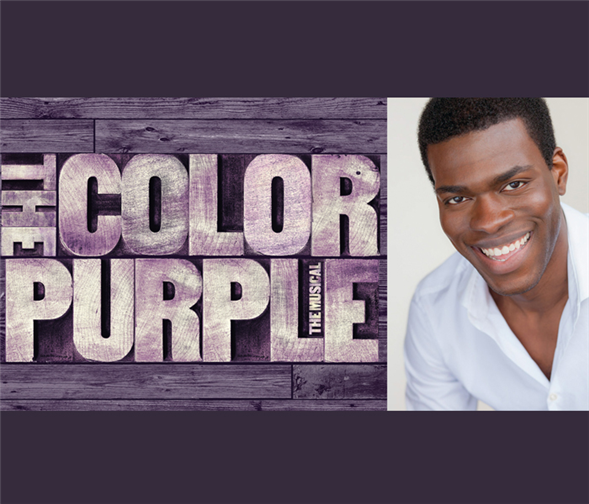Translate Page

In The Color Purple, Kyle Scatliffe rides a delicate line
Caution: The last half of this story contains mild spoilers about The Color Purple.
---
"He's a very gentle person, but when a gentle person is left with someone that's tyrannical for over 10 years, what happens to them?"
Kyle Scatliffe (pictured above) has been asking himself this question about Harpo, the character he plays in the Broadway revival of The Color Purple. Based on Alice Walker's beloved novel, the musical charts how Celie, a poor and abused woman in rural Georgia in the early 20th century, steadily learns to find the beauty in herself and the rest of the world. Her flowering is even more striking because it also changes men like Mister, her shiftless husband, who have mistreated her for her entire life.
And there in the midst of her journey is Harpo, Mister's son, caught between mimicking his father's behavior and treating the women in his life with love and respect. As Scatliffe says, "In any scene, I can make the choice of either being more on his side or being more on the side of the women."
That choice feels especially urgent in this production, which is directed by John Doyle. As he did with musicals like Company and Sweeney Todd, Doyle has stripped The Color Purple to its essence, placing the actors on a bare-bones set and keeping their movements and choreography restrained. That leaves us to focus on the intensity of personal relationships and the heat of inner lives.
Therefore, when Harpo meets Sofia, his great love, we can't avoid his confusion about whether he's supposed to beat her to keep her obedient or support her in her fierce independence. Similarly, he is drawn to women like Sofia, Celie, and Shug Avery (a bewitching singer who performs at Harpo's juke joint), but he doesn't know if caring for them makes him less of a man.
It's up to Scatliffe to embody that ambivalence. "That's been the challenge so far – finding the balance of what I am in each scene," he says. "In some scenes I'm more vulnerable, but then you hit the juke joint, and inside the juke joint I'm trying to be more like [Mister]."
A particularly tough scene, he adds, is the one where Mister tells Harpo he ought to beat Sofia, then Celie says that beating her is the only way to control her. From our vantage point in the audience, it seems clear that Celie says that as a warning, not as an invitation, while on the other hand, Mister is ready to give Harpo a weapon. Eventually, Harpo does try to beat Sofia (off stage), but the question is how he feels about it.
"In the first few previews, I was doing it in a way that's frustrated," Scatliffe says. "John wanted it to be more vulnerable, and in these last few nights, I've been playing it that way. I've really been finding that it's a matter of seeing [the abusiveness] in Mister's nature and not seeing it in mine. It's just something I'm told to do, and I'm like, 'Alright. I don't even know if this is correct.'"
He'll continue shaping his performance as the production runs at the Bernard B. Jacobs Theatre. (It officially opens on December 10). But no matter how he plays the early scenes, he knows he has to reach "Any Little Thing," a sexy duet between Harpo and Sofia in Act II. The song only works if Harpo has decided to meet Sofia head-on, as a peer, and we have to believe in that decision.
"It's really important for him and Sofia to become what they have been all along," Scatliffe says. "That song would've happened right after she met his father, if Mister was just like, 'Okay, sure!' The obstacle of male oppression in the world is the obstacle they both have to overcome to get to that song."
---
TDF Members: Click here to see all our discounted tickets for theatre, dance, and concerts.
Follow Mark Blankenship at @IAmBlankenship. Follow TDF at @TDFNYC.